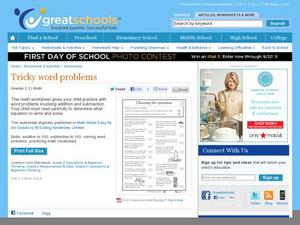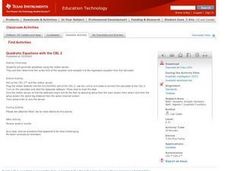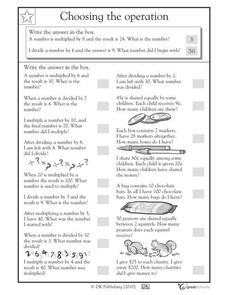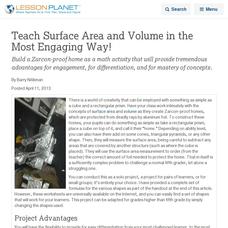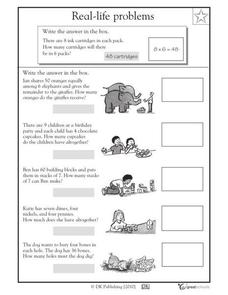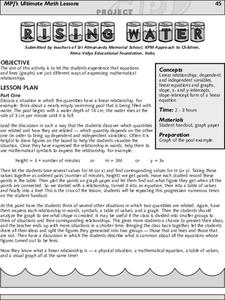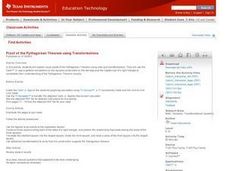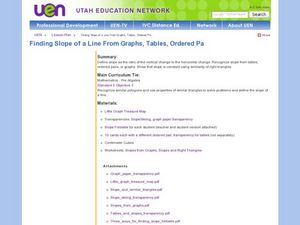Curated OER
Dividing Whole Numbers by the Power of Ten
Knowing how to properly place the decimal point when dividing by powers of ten is an important skill. Here is a lesson which should give your learners a good understanding of this technique. One nice thing about the lesson is the many...
Fraction Bars
Subtraction of Decimals
Here is a fabulous lesson on subtracting decimals with different numbers of decimal places. There are teacher-led activities for learners to engage in, including, modeling decimal subtraction through decimal squares, looking at place...
Fraction Bars
Multiplying Fractions Times Whole Numbers and Fractions
Fifth graders make the connections using models between multiplying a fraction times a whole number and multiplying a fraction times a fraction. After completing three teacher-led activities, pupils access a website on their own to play...
Curated OER
Subtracting Fractions - Unequal Denominators
Subtracting fractions that have unequal denominators is a tricky process. The lesson utilizes fraction bars as a manipulative, in order to understand subtracting fractions and estimating differences. After completing three activities in...
Florida Center for Instructional Technology
A Human Number Line: Teacher Notes
Twenty-one pieces of tagboard can lead your class to a greater understanding of integers when you use them to form a human number line. After creating this math tool, two strategies for adding and subtracting will have your...
Oklahoma State University
A Hundred Bales of Hay
This lesson combines math, visual arts, and language arts activities that all focus on the making, and baling of hay. The activities can be adjusted to address different age ranges. Most of the activities focus on gaining...
Howard Hughes Medical Institute
Survival of the Fittest - Variations in the Clam Species Clamys sweetus
It's not often that you come across a clever laboratory activity that is both imaginative and comprehensive! Using M&M's and Reese's peanut butter candies to represent two different clam species, young biologists test for "relative...
DK Publishing
Tricky Word Problems - Choosing the Operation
Decipher the equations in these addition and subtraction word problems. Two examples at the top of the page guide second graders as they solve the rest of the problems. There is no space to write out the equation, but there is a place to...
Curated OER
Quadratic Equations with the CBL 2
Learners practice generating parabolas with a motion sensor while determining the vertex form of the equation. They compare it to the regression equation from the calculator onto a data mate software. Each student completes several...
DK Publishing
Real-life Word Problems, Part 5
Bring these four word problems to your second grade class to reinforce addition, subtraction, and money math. The problems provide space to write out the proper equations, as well as separate areas to fill in the answers. Use these...
DK Publishing
Tricky Word Problems, Part 2 - Choosing the Operation
Can your learners figure out which equation to solve? Use this resource to challenge your third graders with word problems involving the four operations. Each problem has a section to write the answer, but pupils will need to write out...
Curated OER
Teach Surface Area and Volume in the Most Engaging Way!
Build a Zarcon-proof home as a math activity that will provide tremendous advantages for engagement, for differentiation, and for mastery of concepts. This activity focuses specifically on surface area and volume using mathematical...
DK Publishing
Number Sentences: Dividing by 4
Division can be a picnic! Given illustrations of picnic foods, such as sandwiches, drinks, and cupcakes, third graders practice their money math and division skills. Have them color the page when they're finished, or bring division to...
DK Publishing
Real-life Word Problems, Part 4
Bring math to real life with this review resource! With five word problems on bars of chocolate, boxes of tissues, and bottles of lemonade, this is an excellent way for fourth graders to apply their math knowledge to real life scenarios....
DK Publishing
Real-Life Word Problems, Part 6
Bring math alive with these five word problems. Using multiplication and division in a space for writing equations, fourth graders solve the word problems and practice writing out the answers in a separate area. Helpful as either a...
Scientific American
Life-Sized Drawing
Ocean explorers or mathematicians research the wreck of the CSS H.L. Hunley. They investigate the actual dimensions of the Hunley using math and measuring skills. Afterward, they sketch a large scale drawing of the submarine outdoors on...
Sri Atmananda Memorial School
Rising Water
An engaging, and not to mention attractive, lesson plan has prealgebra and beginning algebra scholars examining linear relationships. They consider the rising water level as a swimming pool is being filled. They do so by charting and...
Alabama Learning Exchange
How Big Can a Bee Be?
Mathematicians analyze the relationships between surface area and volume. They conduct Internet research, conduct various experiments, record the data in a spreadsheet, and graph the results and compare the rate of increase of surface...
Curated OER
Proof of the Pythagorean Theorem Using Transformations
Middle and high schoolers construct a triangle using Cabri Jr. They construct squares on each of the legs and hypotenuse of the triangle. Pupils show that the area of the squares on the leg equal the area of the square on the hypotenuse.
Discovery Education
Exploring Geometry
Middle schoolers construct a three-dimensional model of a city using both similar and congruent figures and geometric transformations. City must have at least ten buildings with each building labeled and may be constructed out of paper...
National Security Agency
A Balancing Act: Solving Multi-Step Equations
Wow! Put on that thinking cap and solve multi-step equations. To solve equations, learners review the use of the distributive property and combining like terms. This three-day lesson comes with about 20 pages of worksheets, warm-ups,...
Utah Education Network (UEN)
Finding Slope of a Line from Graphs, Tables, and Ordered Pairs
Middle schoolers explore the concept of slope in numerous ways and start to look at simple linear equations. They describe the slope in a variety of ways such as the steepness of a line, developing a ratio, using graphs, using similar...
Illuminations
Circumference and Areas of Circles
Middle and high schoolers listen to a scenario about a puppy and use the scenario to develop formulas in order to find the area of a circle. In this circumference lesson, pupils understand how to find the radius, diameter, area of a...
Curated OER
Is There a Limit to Which Side You Can Take?
Calculus students find the limit of piecewise functions at a value. They find the limit of piecewise functions as x approaches a given value. They find the limit of linear, quadratic, exponential, and trigonometric piecewise functions.









